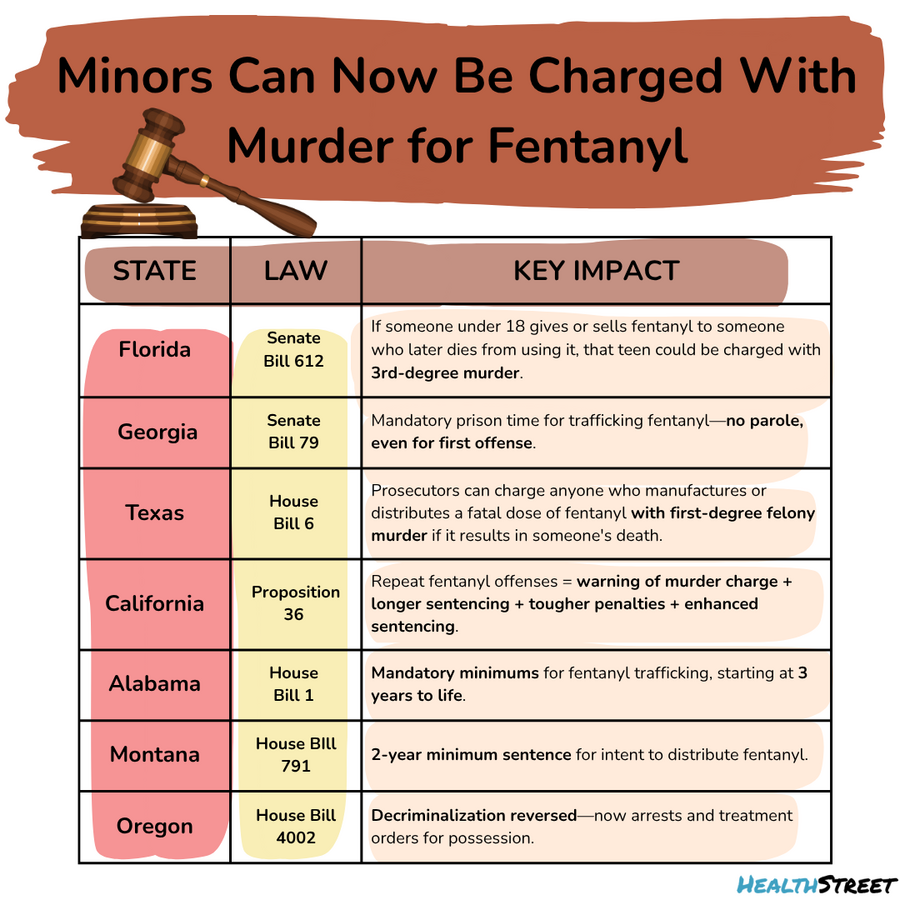Minors Can Now Be Charged With Murder for Fentanyl
The war on fentanyl just got a lot more serious, especially for minors. If you've been following the news, you've probably noticed more and more states are rolling out new laws aimed at stopping the spread of fentanyl. Lawmakers across the country are passing laws that make it possible to charge minors with murder if they distribute fentanyl that leads to someone's death. In certain states, teens caught dealing deadly doses could now face the same legal consequences as adults in homicide cases.
In 2025, Florida and Georgia passed new laws, and other states have been moving in the same direction. Here's a breakdown of what's changing and what it could mean where you live.
Listen to article

Florida: Teens Who Distribute Fentanyl Could Face Murder Charges
Florida just signed a new law for holding minors accountable in the fentanyl crisis. CHAPTER 2025-69, also known as Senate Bill 612, goes into effect on July 1, 2025.
Under this law, if someone under 18 gives or sells fentanyl (or something laced with it) to someone who later dies from using it, that teen could be charged with third-degree murder, which is a second-degree felony under Florida law.
The idea here is to treat these cases just as seriously as adult offenses, especially as more fentanyl deaths involve teenagers, both as victims and distributors.
Georgia: Mandatory Prison Sentences for Fentanyl Trafficking
Georgia also passed a new fentanyl law this year. It's called Senate Bill 79, or the Fentanyl Eradication and Removal (FEAR) Act, and it creates some of the harshest penalties for trafficking fentanyl in the country.
Here's the main point: if someone is convicted of drug trafficking fentanyl in Georgia, they now face mandatory minimum prison sentences, even for first-time offenders. That means no parole, no early release, just straight time behind bars.
This was signed into law by Governor Brian Kemp in March 2025, and will become effective on July 1, 2025.
Texas: Delivering Fentanyl Can Now Be Charged as Murder
In 2023, the state passed House Bill 6 (HB 6), which took effect on September 1, 2023, and made one thing clear: if you deliver fentanyl that results in someone's death, you can now be charged with murder even if you didn't mean to kill anyone.
Under HB 6, prosecutors can charge anyone who manufactures or distributes a fatal dose of fentanyl with first-degree felony murder if it results in someone's death. This puts fentanyl deaths in the same legal category as intentional homicide.
Texas has already started using this law. For example, in May 2025, Texas prosecutors used the new HB 6 law to file two separate murder charges against a woman in Crockett and another against a man in Lubbock. Both cases involved fatal overdoses of illicit fentanyl.
California: New Rules for Repeat Offenders
In late 2024, voters approved Proposition 36 (The Homelessness, Drug Addiction, Theft Reduction Act). This went into effect on December 18, 2024, and includes major changes to the state's fentanyl laws.
The law requires courts to warn individuals convicted of certain drug offenses, including those involving fentanyl, that continued conduct could lead to homicide charges, including murder (Health & Safety Code § 11369). It also adds longer sentencing based on the weight of fentanyl involved, with up to 25 additional years for trafficking large quantities (Health & Safety Code § 11370.4). Additional changes include tougher penalties for having fentanyl while armed with a gun and a new felony charge for people with two or more prior drug convictions (Health & Safety Code § 11395). It also allows enhanced sentencing when fentanyl use causes serious injury or death (Penal Code § 12022.7(f)(2)).
Other States Taking Action
-
Alabama passed new mandatory minimums (under HB1) for fentanyl trafficking based on weight, starting at 3 years and scaling up to life imprisonment.
-
Montana's HB791 requires a minimum 2-year prison sentence for anyone caught distributing or possessing fentanyl with intent to distribute.
-
Oregon's HB 4002 reverses the decriminalization policy for having small amounts of fentanyl and other hard drugs, allowing law enforcement to make arrests and courts to order treatment.
What This Means Moving Forward
Although the HALT Fentanyl Act (S.331) is still awaiting approval in the House of Representatives, states simply aren't waiting for a federal solution. They're taking action, and fast, to try to save lives. What used to be seen as a bad decision or a low-level offense is now being treated like homicide in some states. For minors, that means actions once seen as "just drug deals" could now carry murder charges. For adults, mandatory prison time is increasingly becoming the norm, even for first offenses.
At the same time, some states are building in harm reduction treatment options and warning systems, trying to stop repeat offenses before they happen. Overall, the way states are handling fentanyl is changing fast. One bad choice with fentanyl can cost lives, and now it can also cost freedom.







